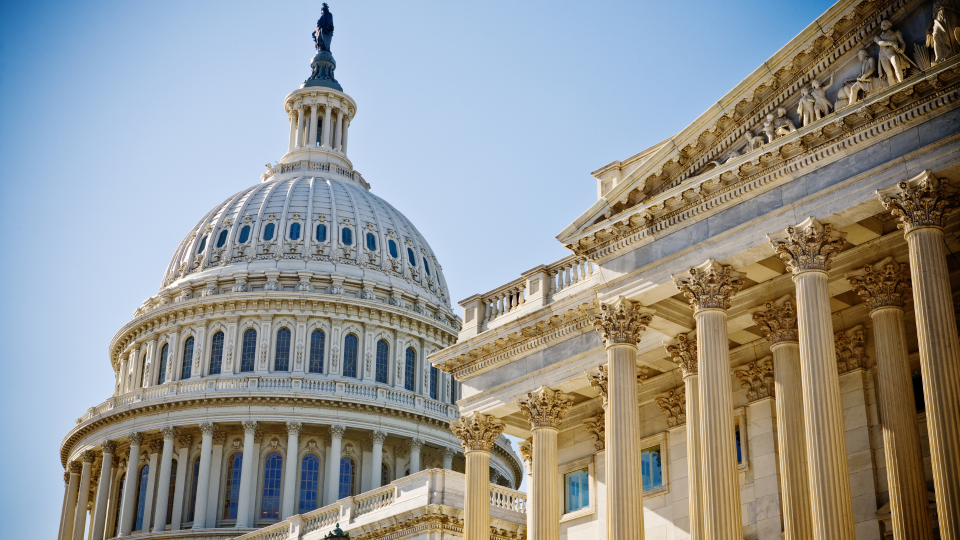(Washington, D.C.) – The Industrial Innovation Initiative, an ambitious coalition of key industrial and power companies, environmental organizations, and state officials from Midwestern and Gulf Coast states focused on decarbonization solutions for the region’s most important industrial sectors, submitted recommendations to Congress today outlining measures for consideration in COVID-19-related federal economic recovery legislation.
“The industrial sector is a pivotal economic driver in the American heartland,” said Brad Crabtree, Vice President for Carbon Management at the Great Plains Institute, “These recommendations focus on fostering recovery from COVID-19 through federal investments that spur economic activity and create and maintain jobs in the near term while putting American industry on a longer-term path to deep emissions reductions, high-wage jobs, technology leadership, and economic competitiveness.”
The effects of COVID-19 on the industrial sector are profound. Demand has declined for many commodity products due to a lack of travel and a decrease in business and consumer confidence and purchasing, leading to widespread plant closures and other significant financial and operational consequences for U.S. industry.
At the same time, industrial emissions constitute approximately one-third of global and one-third of U.S. carbon emissions when considering the direct and indirect emissions from electricity used by industry. Without concerted action, industrial emissions are expected to continue increasing globally over the coming decades once economies begin to recover from the pandemic. However, development and broader commercial deployment of emerging and established technologies and processes could enable deep emissions reductions in the sector, while preserving and growing U.S. industrial production and associated employment and tax base in the wake of COVID-19.
The recommendations aim to incentivize investment in low-carbon technologies, processes, products, and markets within the industrial sector, including: low- and zero-carbon heat; carbon capture, transport, utilization, and geologic storage; energy efficiency; and other innovative industrial applications and practices that can reduce emissions well below current best practices.
“Although every industrial sector is unique, each has experienced the effects of COVID-19 and is grappling with economic retrenchment and job losses caused by the pandemic. By bringing multiple industries together during this time, eight priority policies emerged that not only have the potential to foster a robust economic and jobs recovery, but also position American industry longer-term to meet midcentury emissions reduction goals,” said Nicholas Bianco, Deputy Director, World Resources Institute United States.
The Initiative’s federal economic recovery recommendations include:
- Allow a direct pay option for energy efficiency, clean energy and industrial tax credits that target industrial carbon emissions reductions;
- Eliminate 45Q tax credit eligibility thresholds for industrial facilities and carbon utilization projects, which deter technology innovation and emissions reductions;
- Authorize funds for a temporarily expanded U.S. Department of Energy (DOE) cost-share program for commercial-scale technology demonstrations, front-end engineering and design studies, and saline geologic storage sites;
- Enhance financial support for early-stage deployment of clean industrial technologies by removing barriers to the Title 17 DOE loan guarantee program, and revise eligibility criteria to include key industrial technologies;
- Lower the cost of investing in new production lines for designated clean technologies by renewing and expanding the Section 48C Advanced Manufacturing Tax Credit Program;
- Enhance technical assistance for the deployment of commercially available industrial decarbonization technologies through DOE’s Better Buildings, Better Plants Initiative;
- Expand block grant funding for states to support industrial efficiency, with increased funds for states that establish programs to help build market demand for low-carbon products; and
- Augment investment in research, development, and pre-commercial demonstration (RD&D) of innovative industrial emission reduction technologies.
The listed policy recommendations would provide assistance for breakthrough technologies at all levels of development—from later-stage research and development to commercial-scale deployment—so that technology innovation and project development currently underway are not halted due to the current financial challenges and market uncertainty.
Selected policies were designed to satisfy four criteria: 1) provide near-term potential to drive economic activity and preserve and create well-paying jobs; 2) support investment in and deployment of industrial technologies, processes, and infrastructure that will reduce emissions and enhance competitiveness in a future low-carbon economy; 3) be implemented quickly, relying on existing authority and avoiding the need for further rulemaking or guidance procedures, where possible; and 4) have prospects for broad bipartisan support.
Click here to read the two-page summary of the Initiative’s recommendations.
Click here to read a detailed summary of the Initiative’s recommendations.
Click here to read the Initiative’s letter to Congress
Below are quotes of support from Industrial Innovation Initiative participants:
“In the middle of the worst economic crisis since the Great Depression, the U.S. industrial sector can literally help rebuild our nation’s economy to be stronger, cleaner, and more resilient. Investing in R&D, demonstrating new industrial technologies, and incentivizing manufacturers to improve efficiency and cut carbon are the types of smart policies that can keep American industries and workers competitive through the ups and downs of a global economy for decades to come.” – Josh Freed, Senior Vice President for the Climate and Energy Program, Third Way
“Industrial sources account for a quarter of US greenhouse gas emissions, but largely remain a climate blind spot. Involving complex processes and emissions sources, including in trade-exposed industries, the sector will require a suite of technologies and strategies for decarbonization. In particular, hydrogen, for industrial heat and feed, and carbon capture, for process and other emissions, will be needed at commercial scale. The I3 recommendations emphasize both of these solutions and encompass concrete steps and policy actions paving the way for industrial sector decarbonization on the road to net-zero emissions by mid-century.” – Lee Beck, CCUS Policy Innovation Director, Clean Air Task Force
“Solidia fully supports the recommendations emerging from the important work of the Industrial Innovation Initiative. The work centers on critical topics including energy efficiency, carbon management, and clean industrial technologies, as well as actionable suggestions on how the government and industry can collaborate to advance promising innovations to help solve some of our most pressing climate challenges.” – Bo Boylan, Chief Commercial Officer, Solidia
“As a leading company in the construction materials sector, LafargeHolcim actively encourages Congress to take action on climate change during its next COVID recovery package. Our investments across the United States in wind, solar, energy efficiency, and carbon sequestration are clear examples of our belief that renewable power and innovation are the pathway to decarbonize the sector.” – Jamie Gentoso, Chief Executive Officer, US Cement, LafargeHolcim
“As a nexus of oil and gas producers, industrial consumers, pipeline transporters, and potential geologic storage, Louisiana stands in support of these recommendations. New carbon management incentives and strategies offer a unique opportunity to simultaneously provide benefits to existing industries, developing new technologies and the environment. Rarely do we see such opportunities to balance the needs of energy industry, economic growth, and the environment to such mutual potential benefit. As our state and nation seek to map the path forward once the pandemic conditions have receded, carbon capture, transport, and storage can provide new opportunities for recovery in the energy sector and future growth for the petrochemical industry it supplies. Louisiana is ready to take the next steps in working with our federal and corporate partners to make carbon management a major part of the economic recovery process and future economic development, while still providing new and better protection for the environment we all share.” – Thomas Harris, Secretary of Natural Resources, Louisiana Department of Natural Resources
“The recommendations released today by the Industrial Innovation Initiative highlight an important fact: that having cleaner air, cleaner water, and tackling climate change can be done in a way that also supports economic growth. This collaboration between corporations, environmental organizations, and state officials, demonstrates that diverse interests can come together to find solutions that tackle near-term economic challenges while still moving us toward the net-zero emissions economy that science says we need to avoid the worst impacts of climate change.”
– Anna Dirkswager, Midwest Climate and Energy Policy Adviser for The Nature Conservancy
About Industrial Innovation Initiative (I3): An ambitious coalition bringing together key industrial and power companies, environmental organizations, and state officials from Midwestern and Gulf Coast states. The initiative focuses on decarbonization solutions for the region’s most important industrial sectors and seeks to accelerate the adoption of those solutions through state, regional, and federal policy. I3 is co-convened by the Great Plains Institute (GPI) and the World Resources Institute (WRI).
About Great Plains Institute (GPI): As a nonpartisan, nonprofit organization, GPI works with diverse interests to transform the energy system to benefit the economy and environment. We combine our unique consensus-building approach, expert knowledge, research and analysis, and local action to work on solutions that strengthen communities and provide greater economic opportunity through creation of higher paying jobs, expansion of the nation’s industrial base, and greater domestic energy independence while eliminating carbon emissions. Learn more at www.betterenergy.org.
About World Resources Institute (WRI): World Resources Institute (WRI) is a global research organization that spans more than 60 countries, with offices in Africa, Brazil, China, Europe, India, Indonesia, Mexico and the United States. Its more than 1,000 experts and staff work closely with leaders to turn big ideas into action at the nexus of environment, economic opportunity and human well-being. WRI’s Energy Program has in-depth expertise engaging with utilities to shape renewable energy offerings that meet the needs of buyers. More information on WRI can be found at wri.org or on Twitter @WorldResources.
Media Contacts
Ben Finzel, ben@renewpr.com, 202-277-6286, Great Plains Institute
Rhys Gerholdt, rhys.gerholdt@wri.org, 202-341-1323, World Resources Institute

